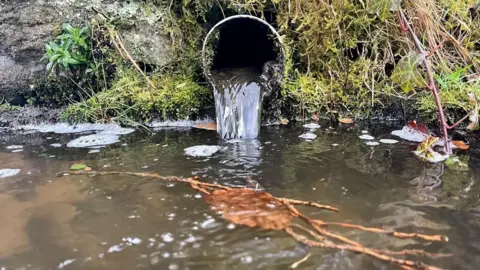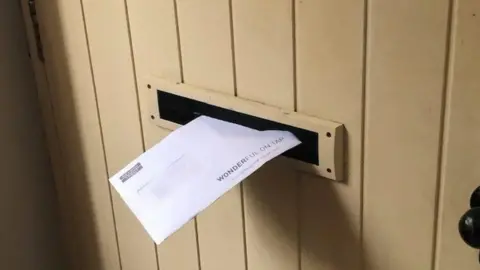Why are water bills rising more in some areas?
 Getty Images
Getty ImagesThe cost of living crisis has seen fuel and energy bills rise sharply - but water customers in some parts of the country have also noticed an increase in their bills. BBC News asks what lies behind it.
Which water companies have seen higher rises?
Of the 11 water and sewerage companies in England and Wales, customers of Northumbrian Water (10.8%) and Severn Trent (7.1%) have seen the highest average bill rises.
Customers of some other companies have actually seen average bills fall.
How have customers reacted to these changes?
Customers have expressed anger.
Steve Willey, from Sherwood, Nottingham, is served by Severn Trent Water, which is seeing the second highest average rise in the country. He said the increase was "not fair".
"The cost of living keeps going up all the time at the moment. It seems bills are going up and National Insurance keeps going up," he said.
"People are going to struggle to heat their homes at the moment. I'm very annoyed about it - very angry."

MPs have also criticised the rises, with Ashfield's Lee Anderson saying: "I understand the argument they have extra costs, but a 7% increase when, in other areas of the country it's about 3-4% - they really need to look at it again."
What is the reason for the rise?
 Getty Images
Getty ImagesInflation is the main reason, according to regulator Ofwat.
All water companies are able to increase bills in line with inflation. As a result, some bills are going up significantly due to rising inflation rates.
However, some water companies have also been allowed to charge their customers more.
The companies operate in five-year business cycles, with the latest running until 2025, where Ofwat approves the services they will deliver and the amount they will charge for them.
A review by the Competition and Marketing Authority (CMA) approved some of the investment Ofwat had initially ruled out.
This has meant four companies - Anglian, Bristol, Northumbrian and Yorkshire - saw changes to their price controls.
Are customers paying for environmental failings?

Customers currently do not pick up the costs of fines imposed on water companies due to failures to meet standards, according to the Consumer Council for Water (CCW).
This means when companies such as Severn Trent are fined £1.5m for sewage discharge, that eats into their profits, rather than being added on to bills.
However, customers do ultimately fund the costs of improving standards - and the challenges faced in different regions play a part in the discrepancy in bills.
Environment Secretary George Eustice said concerns about water companies discharging raw sewage into rivers were likely to feed into the next negotiation in 2025 - and customers will end up paying.
He told the BBC: "The truth is that you can't make the sort of investments that we need to improve sewage infrastructure, without some payment somewhere.
"It's why we're taking a decision not to eliminate all storm overflows overnight because the cost of that could be several hundred billion pounds and that would be a very, very sharp increase in water bills.
"But we're taking the pragmatic approach which is reducing the most harmful storm overflows, and there will be a cost associated with that.
"Everything in the end has to be paid for in some way.
"And if you're going to have that target to reduce sewage overflows into the water, there's a cost of putting in place that kind of infrastructure."
How high were bills to start with?

While Northumbrian Water and Severn Trent have seen the highest rises for 2022/23, their average bills - at £365 and £389 respectively - remain lower than those in other parts of the country.
Average bills in Cornwall, Devon and parts of Somerset and Dorset - served by South West Water - were £472.
Customers in that region get a government reduction, due to the region's long coastline and the amount of bathing water that requires maintenance.
Users of Wessex Water - which also supplies water to Somerset and Dorset, as well as Bristol and Wiltshire, saw average bills stand at £470.
Experts say the wide variation in bills comes down to factors such as how spread out the population is - dense, urban areas tend to cost less to supply - and how much coastline the region has.
South West Water said: "Providing our services across a large geographic area which includes about a third of the country's bathing waters means we need more treatment works and thousands of miles of pipes."
A Wessex Water spokesperson said: "Bills in the region are slightly higher than other parts of the country because there are more pipes per customer to maintain and the cost of moving water across our region is expensive."
How much help are households getting?
 Andrew White
Andrew WhiteWhile the water industry said it has support for anybody struggling to pay their bills, consumers fear this also lacks standardisation.
The CCW, a consumer body, said there were big regional variations in the percentage of households receiving support.
It said the problem is particularly acute in regions like the North West, where 12% of households need support but only about 3% of households were currently receiving such help.
In Severn Trent's region, it said only about 21% of those facing water poverty were lifted out of it by current support schemes.
Schemes differ across the country, depending on the arrangements the companies have with their customers - whose bills fund such support.
The CCW's senior policy manager Andrew White said: "It's a big concern for us and we have set out a number of different recommendations to replace the current postcode lottery of support.
"Water is often one of the first bills to go unpaid, because you can't be disconnected from your supply. But there are also many families suffering in silence, who pay their water bill but make sacrifices on other bills, such as food."
Christine McGourty, CEO of Water UK, the trade association representing water companies, said: "I would urge anyone who's concerned to get in touch with their water company."
What do the water companies say?
 Northumbrian Water
Northumbrian WaterBoth Severn Trent and Northumbrian Water said that while they have seen the highest rises, the amount they charge was still lower than average bills in other parts of the country.
Northumbrian Water said: "Our bills remain the lowest combined water and sewerage charges in England and continue to be less than what our customers paid for their water charges in 2019/2020."
They said they were working on a number of projects in the North East to improve the company's environmental performance, such as a £30m spend on sewer improvements in County Durham and an investigation into bathing quality water at Marsden Beach, in South Tyneside.
They said they were also spending £145m on the supply network across County Durham and Teesside, replacing sections that were more than 100 years old.
Northumbrian Water's chief executive Heidi Mottram said: "These essential investments, together with the rising costs of inflation has meant it is necessary for us to increase our prices by a small amount."
A Severn Trent spokesperson said: "The recent change to customer bills is linked to inflation, reflecting the cost of living increase we're experiencing right across our supply chain.
"This also factors in the levels of investment we're making in our infrastructure and the environment."
Will the government intervene?

Nadia Whittome, the Labour MP for Nottingham East, has called for private companies to be brought back into public ownership.
"Water has a monopoly which means people don't have any choice about who their water provider is. Companies like Severn Trent can charge what they want and privatisation is actually costing us more money," she said.
But so far, the government has proved lukewarm about such suggestions.
Rising bills, it said, were in line with the revenue controls set by Ofwat.
Regarding water poverty, the CCW is hopeful it will get government backing for a single water bill assistance scheme, which would standardise support.
But this may not happen until 2025 - and campaigners argue many customers need help now.

Follow BBC East Midlands on Facebook, Twitter, or Instagram. Send your story ideas to [email protected].
